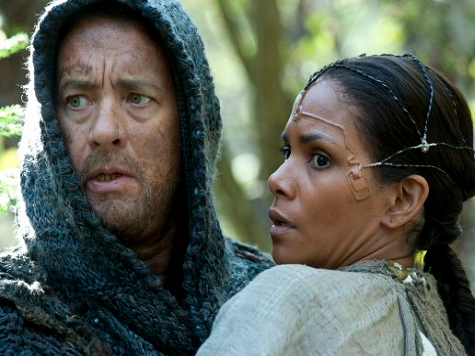For a movie so jammed full of stuff–nearly three hours’ worth of it–“Cloud Atlas” feels oddly empty. Written and directed by Lana and Andy Wachowski and German filmmaker Tom Tykwer (“Run Lola Run,” “The International”), the picture is both madly ambitious and ultimately banal. Viewers unfamiliar with the 2004 David Mitchell novel on which it’s based may also find it baffling.
The movie interweaves six stories spread across 500 years–tales that intend to demonstrate for us the reincarnation of spirits, the persistence of love, and the timeless yearning for freedom. In his book, Mitchell firmly establishes each of these stories before moving on to the next and then circling back. Here, the narrative elements have been finely diced into what I suppose would have to be called a mosaic.
And so we begin with Tom Hanks muttering by a post-apocalyptic campfire far in the future, and then abruptly jump to 1849, where a young attorney (Jim Sturgess), making his way among the Pacific islands, discovers the ugly realities of the world slave trade while being slowly poisoned by a skeezy doctor (Hanks again) aboard the ship on which he’s traveling. Before we can quite process this, we find ourselves in England in 1936, where a young composer named Frobisher (Ben Whishaw) is taking leave of his boyfriend, Rufus Sixsmith (James D’Arcy), before departing for Edinburgh, where he’s to become an amanuensis to a crabby older composer named Ayrs (Jim Broadbent). Frobisher is working on a beautiful piece of music called The Cloud Atlas Sextet, and as we eventually see, Ayrs wants to claim it as his own.
Read the full review at Reason.com

COMMENTS
Please let us know if you're having issues with commenting.